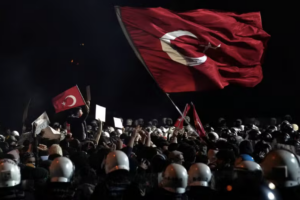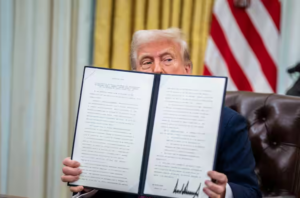A Radical Intervention: Yoon’s Martial Law Declaration
On December 3, 2024, President Yoon stunned the nation by declaring martial law, citing threats from « anti-state forces » and alleged North Korean sympathizers within the government. This decision granted the military sweeping powers, including the suspension of civil liberties and the deployment of troops to the National Assembly to prevent lawmakers from convening.
The response was swift and intense. Opposition lawmakers and civil society groups denounced the move as authoritarian, and mass protests erupted across the country. Some legislators even broke through barricades to enter the assembly and formally challenge the martial law decree. Facing overwhelming backlash, Yoon was forced to rescind the order within hours. However, the damage to his presidency was already done.
The Impeachment Process: Navigating South Korea’s Legal Framework
South Korea’s impeachment process follows a structured legal framework designed to maintain the nation’s constitutional integrity. The steps include:
- Impeachment Motion Submission: At least one-third of the 300-member National Assembly must propose the motion. In Yoon’s case, opposition lawmakers filed the motion just days after the martial law controversy.
- Parliamentary Vote: A two-thirds majority (200 out of 300 members) is required for impeachment. On December 14, 2024, the National Assembly voted overwhelmingly in favor, with 204 votes supporting the motion.
- Suspension from Office: Upon passage, Yoon’s executive powers were immediately suspended. Prime Minister Han Duck-soo assumed the role of acting president.
- Constitutional Court Review: The impeachment now moves to the Constitutional Court, which has up to 180 days to rule. At least six out of nine justices must confirm the charges for Yoon to be permanently removed.
Why Was President Yoon Impeached?
Several key reasons led to Yoon’s impeachment:
- Unconstitutional Martial Law: Yoon’s declaration bypassed democratic checks and was seen as an excessive use of executive power.
- Suppression of the Legislature: Deploying military forces to block the National Assembly was perceived as a direct assault on the legislative branch’s independence.
- Erosion of Civil Liberties: Martial law entailed severe restrictions on freedoms, alarming both domestic and international observers.
These actions were deemed sufficient grounds for impeachment by the National Assembly, reflecting a rare bipartisan consensus against Yoon’s leadership.
Ongoing Trials: Yoon’s Legal Battles
As Yoon awaits the Constitutional Court’s decision on his impeachment, he is also facing multiple criminal trials. The former president has been summoned to court on charges of abuse of power, constitutional violations, and illegal use of military forces. Prosecutors have argued that his declaration of martial law was not only unconstitutional but also part of a broader plan to consolidate power and suppress opposition.
Yoon has appeared in two separate court hearings this month. He maintains that his actions were necessary to « preserve national security » against domestic threats. However, legal experts suggest that his justification is weak. Indeed, no credible evidence has been presented to support claims of an imminent national emergency.
The prosecution has also raised concerns about financial irregularities linked to Yoon’s administration, particularly regarding military contracts and undisclosed foreign transactions. While these allegations are still under investigation, they could further complicate his legal standing and public perception.
International and Domestic Reactions
The impeachment has sparked reactions both at home and abroad.
- Public Outcry and Protests: While Yoon’s supporters claim the impeachment is politically motivated, massive protests have demanded his removal and accountability.
- Global Responses: The U.S., European nations, and neighboring countries like Japan have expressed concern over South Korea’s stability and have affirmed their commitment to democratic principles.
- China and North Korea’s Stance: Beijing has remained cautious, while Pyongyang called the impeachment “a sign of South Korea’s systemic failure.”
Consequences and Future Implications
The impeachment and ongoing trials have far-reaching consequences for South Korea:
- Political Uncertainty: With Yoon’s powers suspended, the nation faces a leadership vacuum.
- Potential for New Elections: If the Constitutional Court upholds the impeachment, South Korea will hold a presidential election within 60 days.
- Legal Precedent: The outcome of Yoon’s trials will set an important legal precedent for executive power and accountability in South Korea.
- Democratic Resilience: The crisis has tested South Korea’s democratic institutions. The swift and lawful impeachment process may reinforce public trust in checks and balances.
As the Constitutional Court deliberates and the trials proceed, South Korea stands at a crossroads. The ruling will determine not only Yoon’s fate but also the future of executive power in the country’s democracy.










